- Home
- Mark Chadbourn
World's End
World's End Read online
world’s end
Also by Mark Chadbourn
The Kingdom of the Serpent:
Jack of Ravens
The Dark Age:
The Devil In Green
The Queen of Sinister
The Hounds of Avalon
The Age of Misrule:
World’s End
Darkest Hour
Always Forever
Underground
Nocturne
The Eternal
Testimony
Scissorman
For more information about the author and his work, visit: www.markchadbourn.com
world’s end
book one of
the age of misrule
MARK CHADBOURN
an imprint of Prometheus Books
Amherst, NY
Published 2009 by Pyr®, an imprint of Prometheus Books World’s End. Copyright © 2009 by Mark Chadbourn. All rights reserved. No part of this publication may be reproduced, stored in a retrieval system, or transmitted in any form or by any means, digital, electronic, mechanical, photocopying, recording, or otherwise, or conveyed via the Internet or a Web site without prior written permission of the publisher, except in the case of brief quotations embodied in critical articles and reviews.
The right of Mark Chadbourn to be identified as the author of this work has been asserted by him in accordance with the UK Copyright, Designs and Patents Act of 1988. Inquiries should be addressed to Pyr 59 John Glenn Drive Amherst, New York 14228-2119 VOICE: 716-691-0133, ext. 210 FAX: 716-691-0137 WWW.PYRSF.COM 13 12 11 10 09 5 4 3 2 1 Library of Congress Cataloging-in-Publication Data Chadbourn, Mark. World’s end / by Mark Chadbourn. p. cm. - (Age of misrule ; bk. 1) First published: London : Gollancz, an imprint of Orion Publishing Group, 1999. ISBN 978-1-59102-739-3 (pbk. : alk. paper) 1. Title.
PR6053.H23W67 2009 823’.914-dc22 2009005803 Printed in the United States on acid-free paper
For Elizabeth, Betsy, and Joe
contents
Prologue 11
ONE Misty Morning, Albert Bridge 13
TWO Different Views from the Same Window 28
THREE On the Road 49
FOUR The Purifying Fire 63
FIVE Where the Black Dog Runs 84
SIX A View into the Dark 105
SEVEN Here Be Dragons 124
EIGHT The Light That Never Goes Out 141
NINE At the Heart of the Storm 162
TEN The Hunt 184
ELEVEN Away from the Light 196
TWELVE Mi Vida Loca 219
THIRTEEN The Hidden Path 240
FOURTEEN A Murder of Crows 259
FIFTEEN A Day as Still as Heaven 274
SIXTEEN The Harrowing 286
SEVENTEEN Hanging Heads 307
EIGHTEEN The Shark has Pretty Teeth 332
NINETEEN Flight 351
TWENTY Revelations 369
TWENTY-ONE Last Stand 389
TWENTY-TWO Beltane 409
acknowledgments
ob Rickard and the Gang of Fort; John Charlick and Sean Devlin at Trebrea Lodge; Coach and Horses, Salisbury; White Hart Hotel, Okehampton.
For information about the author and his work:
www.markchadbourn.net
www.jackofravens.com
www.myspace.com/markchadbourn
prologue
nd now the world turns slowly from the light. Not with the cymbal clash of guns and tanks, but with the gently plucked harp of shifting moods and oddly lengthening shadows, the soft tread of a subtle invasion, not here, then here, and none the wiser. Each morning the sun still rises on supermarket worlds of plastic and glass, on industrial estates where slow trucks lumber in belches of diesel, on cities lulled by the whirring of disk drives breaking existence down into digitised order. People still move through their lives with the arrogance of rulers who know their realms will never fall. Several weeks into the new Dark Age, life goes on as it always has, oblivious to the passing of the Age of Reason, of Socratic thought and Apollonian logic.
No one had noticed. But they would. And soon.
chapter one
misty morning,
albert bridge
t was just before dawn, when the darkness was most oppressive. London was blanketed by an icy, impenetrable, February mist that rolled off the Thames, distorting the gurgle and lap of the water and the first tentative calls of the birds in the trees along the embankment as they sensed the impending sunrise. The hour and atmosphere were unfriendly, but Church was oblivious to both as he wandered, directionless, lost to thoughts that had turned from discomfort to an obsession, and had soured him in the process. If anyone had been there to see his passing, they might have thought him a ghost: tall and slim, with too-pale skin emphasised by the blackness of his hair and a dark expression which added to the air of disquieting sadness which surrounded him. The night-time walks had become increasingly regular over the past two years. During the routines of the day he could lose himself, but when evening fell the memories returned in force, too realistic by far, forcing him out on to the streets in the futile hope he could walk them off, leave them behind. It was as futile as any childhood wish; when he returned home he could never escape her things or her empty space. The conundrum was almost more than he could bear: to recover meant he would have to forget her, but the mystery and confusion made it impossible to forget; it seemed he was condemned to live in that dank, misty world of not-knowing. And until he did know he felt he would not be whole again.
But that night the routine had been different. It wasn’t just the memories that had driven him out, but a dream that God had decided His work, the world, had gone irrevocably wrong and He had decided to wipe it away and start again. Inexplicably, it had disturbed Church immeasurably.
There was a clatter of dustbins nearby, some dog scavenging for food. But just to be sure, he paused, tense and alert, until a russet shape padded soundlessly out of the fog. The fox stopped in its tracks when it saw him, eyed him warily for a second, until it seemed to recognise some similar trait, and then continued across the road until it was lost again. Church felt a frisson of some barely remembered emotion that he gradually recognised as a sense of wonder. Something wild and untamed in a place shackled by concrete and tarmac, pollution and regulations. Yet after the initial excitement it served only to emphasise the bleak view of the world he had established since Marianne. Perhaps his dream had been right. He had never really been enticed by the modern world. Perhaps that was why he was so drawn to archaeology as a child. But now everything seemed so much worse. If there was a God, what would he want with a world where such a vital force as a sense of wonder was so hard to come by? Although most people seemed to hark back to some golden age where things were felt so much more vibrantly, it seemed to Church, with his new eyes, that they didn’t even seem to have the passion to hate the world they lived in; they were simply bowed by the boredom of it: a place of routine and rules, where daily toil was the most important thing and the only rewards that really counted were the ones that came in currency. There wasn’t anything to get excited about any more; nothing to believe in. You couldn’t even count on God. Churches of all denominations seemed to be in decline, desperately stripping out the supernatural wonder for some modernist sense of community that made them seem like dull Oxfam working parties. But he had no time for God anyway. And that brought him in an ironic full circle: God was preparing to wipe the world clean and God didn’t exist.
He snorted a bitter laugh. Away in the mist he could hear the fox’s eerie barking howl and for a hopeful second he considered pursuing it to a better place. But he knew in his heart he wasn’t nimble enough; his legs felt leaden and there seemed to be an unbearable weight crushing down on his shoulders.
And
then all the thoughts of God got him thinking about himself and his miserable life, as if there were any other subject. Was he a good person? Optimistic? Passionate? He had been once, he was sure of it, but that was before Marianne had turned everything on its head. How could one event sour a life so completely?
It wasn’t the damp that drew his shiver, but he pulled his overcoat tighter nonetheless. Sometimes he wondered what the future held for him. Two years ago there had been so much hope stitched into the direction he had planned for his life: more articles for the learned magazines, a book, something witty and incisive about the human condition, which also instigated a quiet revolution in archaeological thinking, building on the promise he had shown at Oxford when he had become the first member of his family to attain a degree. At twenty-six, he had known everything about himself. Now, at twenty-eight, he knew nothing. He was flailing around, lost in a strange world where nothing made sense. Any insight he thought he might have had into the human condition had been expunged, and poking about in long-dead things suddenly hadn’t seemed as attractive as it had when he’d been the leading light of his archaeology course. It sounded pathetic to consider it in such bald terms, and that made it even more painful. He had never been pathetic. He had been strong, funny, smart, confident. But never pathetic. He had potential, ambitions, dreams, things that he thought were such a vital part of him he would never be able to lose them, yet there he was without any sign of them at all. Where had they all gone?
The only work of which he had felt capable was hack journalism, turning technical manuals into plain English and writing PR copy, bill-paying rather than future-building. And all because of Marianne. Sometimes he wished he could channel his feelings into bitterness, maybe even hate, anything that would allow him to move on, but he just wasn’t capable of it. She’d dragged him out of life and left him on a mountaintop, and he felt he would never be able to climb down again.
With a relief that was almost childlike in its intensity, his thoughts were disturbed by a splashing of water which jarred against the sinuous sounds of the river. At first Church thought it might have been a gull at the river’s edge, another sign of raw nature intruding on his life, but the intermittent noise suggested something larger. Leaning on the cold, wet wall, he waited patiently for the folds of mist to part as the splashing ebbed and flowed.
For several minutes he couldn’t see anything, but as he was about to leave, the mist unfurled in a manner that reminded him of a theatre curtain rolling back. Framed in the white clouds at the river’s edge was a hunched black shape, like an enormous crow. As it dipped into the eddies, then rose shakily, Church glimpsed a white, bony hand. An old woman, in a long, black dress and a black shawl, was washing something he couldn’t see; it made him think of pictures of peasants in the Middle East doing their laundry in muddy rivers. The strangeness of a woman in the freezing water before dawn didn’t strike him at first, which was odd in itself, but the more he watched, the more he started to feel disturbed by the way she dipped and washed, dipped and washed. Finally the jangling in his mind began to turn to panic and he started to pull away from the sight. At that moment the woman stopped her washing and turned, as if she had suddenly sensed his presence. Church glimpsed a terrible face, white and gaunt, and black, piercing eyes, but it was what she held that filled his thoughts as he ran away along the footpath towards Albert Bridge. For the briefest instant it appeared to be a human head, dripping blood from the severed neck into the cold Thames. And it had his face.
Ruth Gallagher had a song in her head that she couldn’t quite place; something by The Pogues, she thought. Then she considered the holiday she hoped to take in the South of France that summer, before admiring the pearly luminescence of the mist as it rolled across the surface of the Thames. And when she opened her ears again Clive was still whining irritatedly.
“And another thing, why do you always have to act so superior?”
Clive gesticulated like he was berating a small child. He didn’t even look at her; he had been lost in his rant for so long that she was no longer needed in the conversation.
“I don’t act superior, I am.” It was the wrong thing to say, but Ruth couldn’t resist it. She had to stifle a smile when a sound like a boiler venting steam erupted from his throat. It didn’t help that at nearly six foot, she towered above him. Such nastiness wasn’t normally in her nature, but he had treated her so badly throughout the evening she felt justified, while still acknowledging the whiff of childishness in her response.
When they had met at the Law Society dinner six weeks earlier, she went into the relationship with the same hope and optimism as always; it wasn’t her fault that it hadn’t worked out. In fact, after so many previous failed relationships, she had tried especially hard, but Clive was like so many other men she had met in recent times: self-obsessed, nervous of her intellect and wit while professing the opposite, quickly becoming insecure when they realised she wasn’t so desperate to hold on to them that she’d kowtow to their every whim and turn a blind eye to their many insufferable qualities. It didn’t take her long to see that Clive equated long, dark, curly hair and refined, attractive features with some pre-war view of femininity which he could easily control.
That sort of attitude could have made her blood boil, but the simple truth was she had realised that night that she felt so far removed from him it was hardly worth losing sleep over.
But Clive was just symptomatic of a wider malaise. Nothing in her life seemed fixed down, as she had expected it would be by the time she approached thirty; the job, her great ambition since her father had instilled it in her at thirteen, left her feeling empty and weary, but it was too late to go back and start over; she was ambivalent about London; the best word she could find for her friends and social life was pleasant. It was as if she was holding her breath, waiting for something to happen.
She hummed The Pogues’ song in her head, trying to recall the chorus, then turned her attention once more to the marvellous way the mist smothered the echoes of their footsteps. Not far to go until she was home, she thought with relief.
“And another thing-“
“If you say that one more time, Clive,” Ruth interjected calmly, “I’ll be forced to perform an emergency tracheotomy on you with my fountain pen.”
Clive threw his arms in the air. “That’s it! I’ve had enough! You can make your way home alone.”
He spun on his heels and Ruth watched him march off into the fog with his head thrust down like some spurned, spoiled child. “The perfect gentleman,” she muttered ironically.
As his footsteps faded away, Ruth became acutely aware of the stifling silence. She wished she’d left the club earlier, or at least countermanded Clive’s order for the cab to pull over so they could have a “quiet chat” as they walked the last few hundred yards to her flat. London wasn’t a safe place for a woman alone. Her heels click-clacked on the slick pavement as she speeded up a little. The rhythm was soothing in the unnerving quiet, but as she approached Albert Bridge other sounds broke through: scuffles, gasps, the smack of flesh on flesh.
Ruth paused. Her every instinct told her to hurry home, but if someone was in trouble she knew her conscience wouldn’t allow her to ignore it. She was spurred into life by a brief cry, quickly strangled, that seemed to come from the river’s edge in the lonely darkness beneath the bridge. Two itinerants fighting over the remnants of a cheap bottle of wine, she supposed, but she had seen too many police reports to know the other possibilities were both many and disturbing. She located the steps to the river and moved cautiously down until the mist had swallowed up the street lights behind her.
When he heard the same struggle, Church’s heart rate had just about returned to normal, but his nerves still jangled alarmingly. The image of the woman’s terrible face wouldn’t go, but he had almost managed to convince himself he had been mistaken in his view of what she was holding. Just a bundle of dirty clothes, a trick of the light and the fog. That was all.
He had been approaching Albert Bridge from the opposite direction to Ruth when the scuffling sounds provided a welcome distraction. Negotiating the treacherously slick steps down to the river, he found himself on a rough stone path that ran next to the slim, muddy beach at the water’s edge, where an oppressive smell of rotting vegetation filled the dank air. A slight change in the quality of light signalled that somewhere above the mist, dawn was finally beginning to break, but the gloom beneath the bridge was impenetrable.
With only the soothing lapping of the Thames around him, he wondered if he had misheard the source of the fight. He paused, listening intently, and then a muffled cry broke and was instantly stifled. Cautiously he advanced towards the dark.
Keeping close to the wall so he wouldn’t be seen, odd sounds gradually emerged: heavy boots on stones, a grunt, a choke. Finally, at the edge of the darkness, his eyes adjusted enough to see what lay beneath the bridge.
A giant of a man with his back to Church grasped a smaller man by the lapels. The victim looked mousily weak, with tiny, wire-framed spectacles on a grey face, his frame slight beneath a dark suit. There was a briefcase lying on the ground nearby.
The taller man, who must have been at least seven and a half feet tall, turned suddenly, although Church was sure he hadn’t made a sound. The giant had a bald head and long, animalistic features contorted by a snarl of rage. In the shadows, his pale, hooded eyes seemed to glow with a cold, grey fire. Church shivered unconsciously at the aura of menace that washed off him in a black wave.
“Put him down.”
Church started at the female voice. A woman with long dark hair and a beautiful, pale face was standing on the other side of the bridge, framed against the background of milky mist.

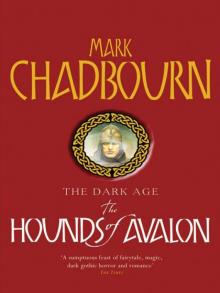 The Hounds of Avalon tda-3
The Hounds of Avalon tda-3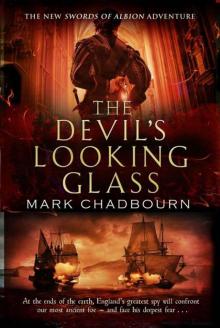 The Devil's Looking-Glass soa-3
The Devil's Looking-Glass soa-3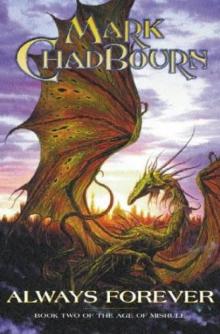 Always Forever taom-3
Always Forever taom-3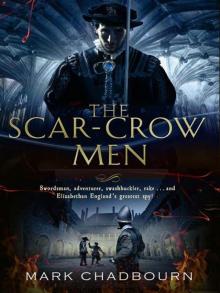 The Scar-Crow Men
The Scar-Crow Men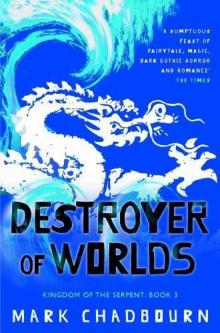 Destroyer of Worlds kots-3
Destroyer of Worlds kots-3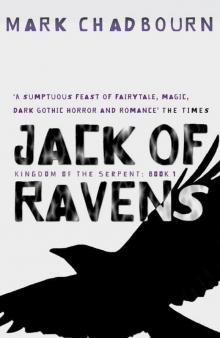 Jack of Ravens kots-1
Jack of Ravens kots-1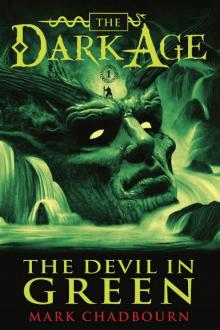 The Devil in Green
The Devil in Green World's End
World's End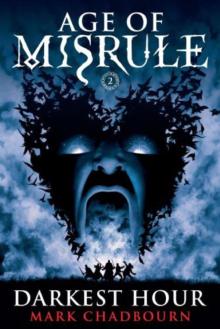 Darkest Hour (Age of Misrule, Book 2)
Darkest Hour (Age of Misrule, Book 2) Destroyer of Worlds
Destroyer of Worlds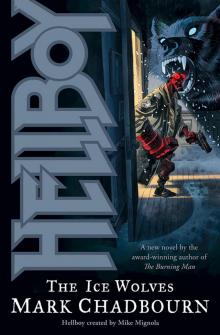 The Ice Wolves
The Ice Wolves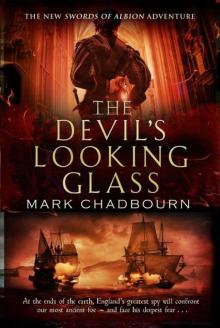 The Devil soa-3
The Devil soa-3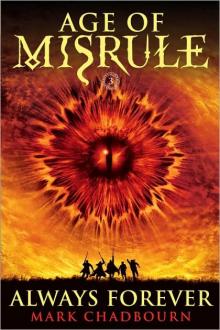 Always Forever
Always Forever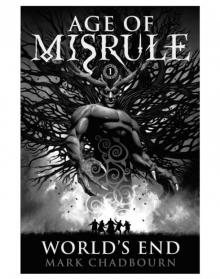 World's End (Age of Misrule, Book 1)
World's End (Age of Misrule, Book 1)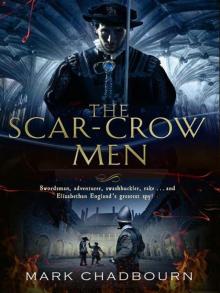 The Scar-Crow Men soa-2
The Scar-Crow Men soa-2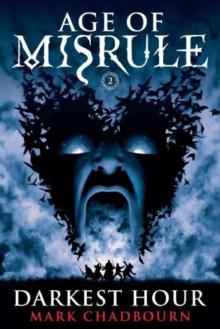 Darkest hour aom-2
Darkest hour aom-2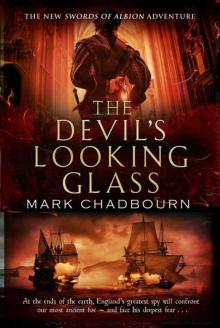 The Devil's Looking-Glass
The Devil's Looking-Glass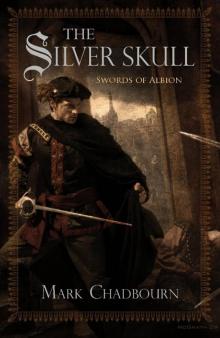 The Silver Skull
The Silver Skull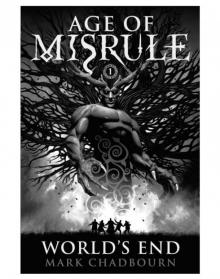 World's end taom-1
World's end taom-1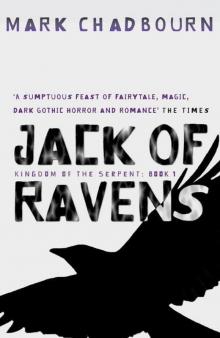 Jack of Ravens
Jack of Ravens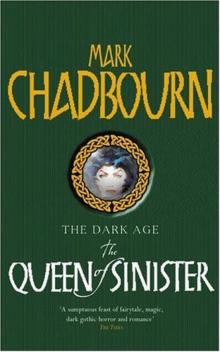 The Queen of Sinister
The Queen of Sinister